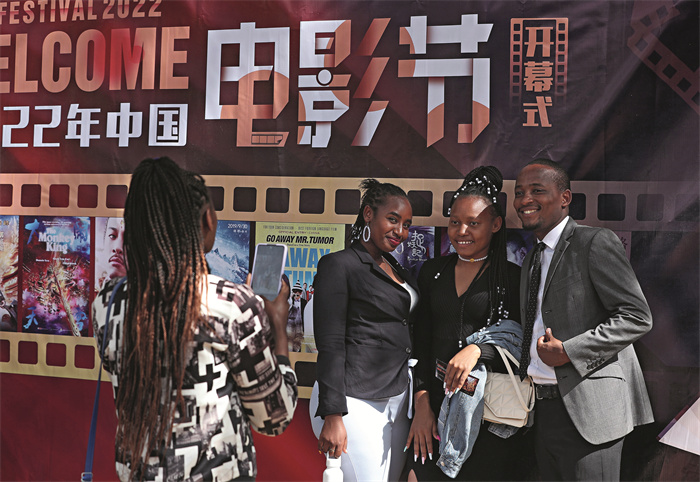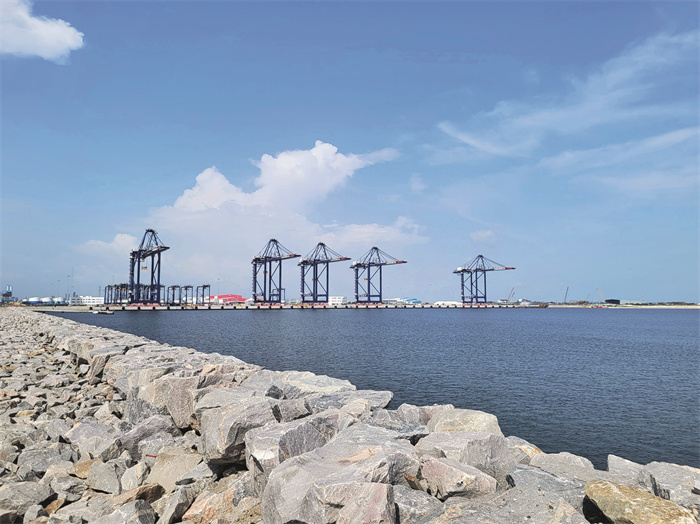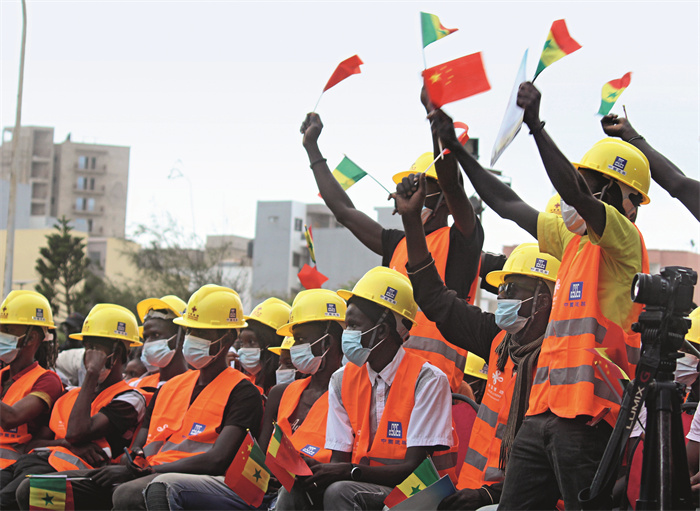|
||||||||||
| Home Nation World Business Opinion Lifestyle ChinAfrica Multimedia Columnists Documents Special Reports |
|
||||||||||
| Home Nation World Business Opinion Lifestyle ChinAfrica Multimedia Columnists Documents Special Reports |
| Current Cover Story |
| A Year of Great Strides |
| Review of China-Africa relations in 2022 and prospects for 2023 |
| By He Wenping 丨VOL. 15 January 2023 ·2022-12-29 |

Visitors pose for a photo in front of a poster of the 2022 Chinese Film Festival in Nairobi, Kenya, on 27 October 2022
The year 2022 was the first year of implementing the outcomes of the Eighth Ministerial Conference of the Forum on China-Africa Cooperation (FOCAC) held in November 2021 in Dakar, Senegal, which adopted four outcome documents, namely the Dakar Declaration, the China-Africa Cooperation Vision 2035, the Declaration on China-Africa Cooperation on Combating Climate Change, and the Dakar Action Plan (2022-2024).
Chinese President Xi Jinping announced the Nine Programmes that China will implement in cooperation with Africa. In the past year, China-Africa cooperation, guided by the four outcome documents, has made considerable progress in areas such as mutual political trust, economic and trade cooperation, and people-to-people exchanges, laying a solid foundation for further implementing the outcomes of the forum in the next two years.
Strengthened mutual political trust
High-level face-to-face communication, such as between heads of state and government, is an important mechanism for strengthening mutual political trust between countries. Although the COVID-19 pandemic has seriously affected the operation of this mechanism over the past three years, China and Africa have overcome difficulties to strengthen high-level communication. One example was the Extraordinary China-Africa Summit on Solidarity Against COVID-19 held on 17 June 2020 under the joint initiative of China, South Africa, then chair of the AU, and Senegal, co-chair of FOCAC.
On 4 January 2022, the first working day after the New Year holiday, Wang Yi, state councillor and foreign minister of China, continued the practice Chinese diplomacy has adhered to for 32 years: choosing Africa as the first destination of the Chinese foreign minister’s visit in a year. Wang visited Eritrea, Kenya and Comoros during the trip, which showed China’s commitment to further strengthening solidarity and promoting common development with African countries in the new year.
In February 2022, President Xi met with Egyptian President Abdel-Fattah al-Sisi, who came to China to attend the opening ceremony of the Beijing 2022 Olympic Winter Games. Xi stressed that the two sides should deepen mutually beneficial cooperation and continue to align the Belt and Road Initiative (BRI) with Egypt’s Vision 2030, as well as advance projects such as the development of the Suez Canal Corridor. He said that China and Egypt should also join hands to take the lead in China-Arab and China-Africa cooperation, accelerate the building of the China-Arab community and China-Africa community with a shared future for the new era, and promote African development and prosperity.
New opportunities for developing China-Africa relations came after the 20th National Congress of the Communist Party of China (CPC) in October 2022. From 2 to 4 November 2022, Tanzanian President Samia Suluhu Hassan paid a state visit to China, the first African head of state to visit China after the congress. The two leaders announced the elevation of China-Tanzania relations to a comprehensive strategic cooperative partnership, marking a new beginning for the future development of the bilateral relations and the building of a China-Africa community with a shared future.
Tanzania was the first stop of President Xi’s trip to Africa after he took office as Chinese President in 2013. It was in Tanzania that President Xi put forward the principle of China’s Africa policy - sincerity, real results, amity and good faith - which has become the basic guiding concepts for China in promoting solidarity and cooperation with Africa and the developing countries in general.
Apart from the Tanzania-Zambia Railway, a landmark Chinese aid project in the history of China-Africa relations built in the 1960s and 1970s, the bilateral relations are also marked by efforts to exchange knowledge on national governance in recent years. One prominent example is the Mwalimu Julius Nyerere Leadership School in Tanzania jointly established by six parties of the former liberation movements of Southern Africa, namely, Tanzania’s Chama Cha Mapinduzi, the African National Congress of South Africa, the Mozambique Liberation Front Party, the People’s Movement for the Liberation of Angola, the SWAPO Party of Namibia and the Zimbabwe African National Union-Patriotic Front. The school has become a place for young leaders to study on topics such as party development, improvement of governing capacity and the Chinese model of development.
In early June 2022, I had the opportunity to give a lecture at a workshop held by the school for young officials on the topic of development in the new era. At the end of the workshop, the participants wrote a letter to President Xi, to which he quickly replied, encouraging the participants to make the best of what they have learned, keep working hard and embrace their youthful ambitions on the journey to realise the dream of national rejuvenation and African rejuvenation.
The visit of Tanzanian President Hassan to China immediately after the 20th CPC National Congress has shown the profound China-Tanzania friendship as well as Tanzania’s emphasis on diplomacy with China.

A view of the Lekki Deep Sea Port in Lagos, Nigeria, on 31 October 2022
Promoting BRI
Development is the most important and top-of-mind issue for African countries. In June 2021, the US proposed the Build Back Better World initiative, followed by the Partnership for Global Infrastructure and Investment initiative in July 2022. With these initiatives, the US intends to increase investment in developing countries including African countries in the area of infrastructure. However, both of these US initiatives are yet to make substantial progress to meet the urgent needs of Africa.
On the contrary, the BRI, launched in 2013, has yielded fruits across almost the entire African continent. Despite the impact of the pandemic, cooperation under the BRI has shown great resilience and dynamism, with progress made in policy coordination, connectivity of infrastructure, unimpeded trade, financial integration, and closer people-to-people ties, which are the five key aspects of the BRI, bringing tangible benefits to Africa’s development.
In terms of policy coordination, on 18 August 2022, the Coordinators’ Meeting on the Implementation of the Follow-up Actions of the Eighth Ministerial Conference of FOCAC was held via video link. In the joint statement, both sides reaffirmed commitment to further advancing the institution building of FOCAC, expressed readiness to leverage the role of the Chinese Follow-up Committee of FOCAC, and welcomed the efforts by the African side to establish and improve the mechanism for implementing follow-up actions, so as to jointly advance the Nine Programmes of China-Africa cooperation. It was also stated that nation-specific pools of projects to be implemented will be set up, and implementation and evaluation of follow-up actions should be strengthened to ensure efficient, results-oriented and smooth implementation of FOCAC outcomes.
In terms of trade, China-Africa economic cooperation and trade have become increasingly close under the BRI, with the scale of trade steadily increasing. According to China’s Ministry of Commerce, China-Africa trade reached a record high of $254.3 billion in 2021, up 35.3 percent year on year, making China the largest trading partner of Africa for the 13th consecutive year. On 2 August 2022, Africa’s first batch of fresh avocados for export to China was packed and loaded at the Sunripe Factory in Limuru Town of Kenya, to be shipped to Chinese cities such as Beijing, Shanghai and Guangzhou.
In terms of infrastructure cooperation, China continues to consolidate its traditional strength in this sector, with the value of contracted projects maintaining growth for the second consecutive year. Recent major projects include the construction of Uganda’s first commercial oilfield with the support of China National Offshore Oil Corp., the Kaleta Hydropower Station in Guinea designed and constructed by China Three Gorges Corp., and the Lekki Deep Sea Port in Lagos, Nigeria, which has been handed over to the Nigerian side.
The BRI projects have not only helped Africa to enhance its economic development capacity, but also laid a solid foundation for the industrial upgrading and development of related countries.
Progress has also been made in terms of financial integration. For example, the China-Africa Development Fund has invested in a total of 110 projects, worth nearly $6 billion, in 37 African countries since its establishment in 2006. Recently, the fund has established the Export Growth in African Countries Partnership Project with partners including the Hunan Provincial Department of Commerce and the United Nations International Trade Centre.
On 23 August 2022, the English and French versions of the Report on Chinese Investment in Africa 2022 - China-Africa Cooperation From a Supply Chain Perspective, compiled by the China-Africa Business Council, were launched in Beijing. This is the first research report compiled and published by the council dedicated to supporting the operations of Chinese private enterprises in Africa. The report analysed the current challenges faced by Africa’s supply chains and, through 12 enterprise cases, showed the positive contribution of China-Africa cooperation to the construction of Africa’s supply chains.
A recent example of closer people-to-people ties is the Our African Partners: CMG Media Cooperation Forum 2022 event, jointly hosted by China Media Group (CMG) Africa and the Institute for a Community with Shared Future of the Communication University of China in November 2022. The forum was attended by executives of media agencies, journalists and scholars from nearly 30 African countries.

Local workers attend a launch ceremony for the Chinafunded renovation of four stadiums in Dakar, Senegal, on 28 June 2022
Highlighting digital economy
The pandemic and the Russia-Ukraine conflict have had a huge impact on the world economy and the process of globalisation. The global economic downturn and the food, fuel and financial crises facing African economies pose challenges to the future development of China-Africa relations. However, the challenges have also given rise to new development opportunities and a stronger desire for cooperation.
At present, African countries have a strong demand for economic transformation and accelerated integration of the continent. In 2023, while continuing to implement the Nine Programmes, China and Africa should focus their cooperation in digital, health and livelihood sectors, as well as small and medium-sized enterprises to enhance the vitality of their economic transformation.
In particular, the potential of the digital economy should be tapped. The demand for developing digital economy in Africa has been strong in recent years, which is becoming a new engine of economic development for African countries. China and Africa complement each other in developing the digital economy. Chinese Internet companies can vigorously explore the African market and make the digital economy and cross-border e-commerce a new growth point for China-Africa cooperation.
The digital economy was also a focus of Tanzanian President Hassan’s visit to China in November 2022, during which she expressed her hope for further promoting cooperation in the sector. In fact, China-Tanzania cooperation in the digital economy has already been carried out for years. With the help of Chinese technology companies, Tanzania’s ICT talent pool has been expanding. In the past three years, Chinese company Huawei has established ICT colleges in 10 Tanzanian universities, with nearly 600 students receiving technical certificates from the company and more than 3,000 ICT engineers receiving technical support. The year 2023 should see stories of such cooperation unfold in more African countries. In addition, with the prevention and control measures of the COVID-19 pandemic eased, people-to-people exchange will recover as more Chinese companies return to Africa and African students return to China.
China and Africa will also further strengthen cooperation in international affairs. At a time of upheavals and adjustments in the international situation, China will continue to support Africa’s independent and diversified diplomacy, support its participation in the G20 and BRICS mechanisms, back African countries’ stance on climate change issues, and enhance Africa’s voice in international discourse.
The author is research fellow with the Institute of West-Asian and African Studies of the Chinese Academy of Social Sciences and researcher of China-Africa Institute
| About Us | Contact Us | Advertise with Us | Subscribe |
| Copyright Beijing Review All rights reserved 京ICP备08005356号-5 京公网安备110102005860号 |